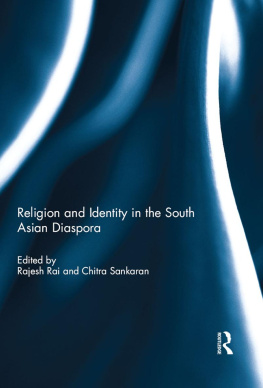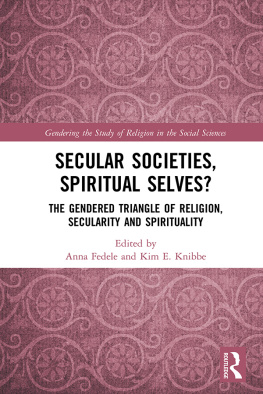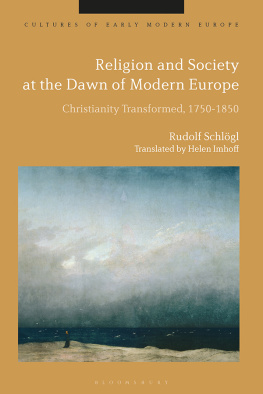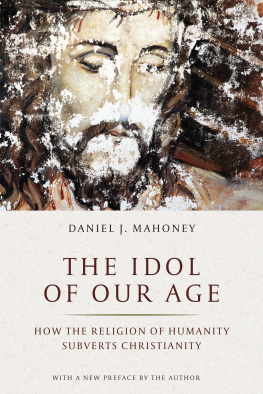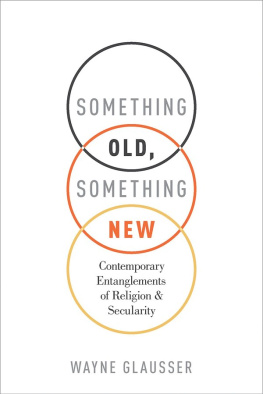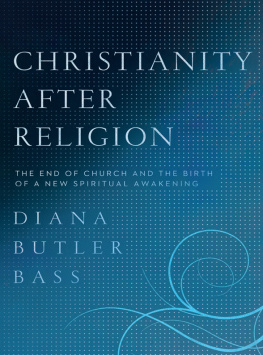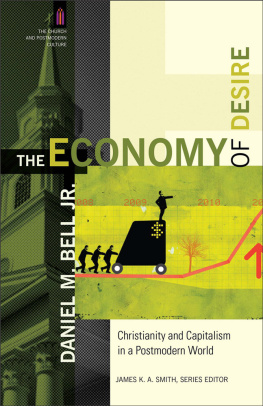Daniel Colucciello Barber - On Diaspora: Christianity, Religion, and Secularity
Here you can read online Daniel Colucciello Barber - On Diaspora: Christianity, Religion, and Secularity full text of the book (entire story) in english for free. Download pdf and epub, get meaning, cover and reviews about this ebook. City: Eugene, OR, year: 2011, publisher: Cascade Books / Wipf and Stock, genre: Religion. Description of the work, (preface) as well as reviews are available. Best literature library LitArk.com created for fans of good reading and offers a wide selection of genres:
Romance novel
Science fiction
Adventure
Detective
Science
History
Home and family
Prose
Art
Politics
Computer
Non-fiction
Religion
Business
Children
Humor
Choose a favorite category and find really read worthwhile books. Enjoy immersion in the world of imagination, feel the emotions of the characters or learn something new for yourself, make an fascinating discovery.

- Book:On Diaspora: Christianity, Religion, and Secularity
- Author:
- Publisher:Cascade Books / Wipf and Stock
- Genre:
- Year:2011
- City:Eugene, OR
- Rating:5 / 5
- Favourites:Add to favourites
- Your mark:
- 100
- 1
- 2
- 3
- 4
- 5
On Diaspora: Christianity, Religion, and Secularity: summary, description and annotation
We offer to read an annotation, description, summary or preface (depends on what the author of the book "On Diaspora: Christianity, Religion, and Secularity" wrote himself). If you haven't found the necessary information about the book — write in the comments, we will try to find it.
On Diaspora: Christianity, Religion, and Secularity — read online for free the complete book (whole text) full work
Below is the text of the book, divided by pages. System saving the place of the last page read, allows you to conveniently read the book "On Diaspora: Christianity, Religion, and Secularity" online for free, without having to search again every time where you left off. Put a bookmark, and you can go to the page where you finished reading at any time.
Font size:
Interval:
Bookmark:
T he impetus behind this book is not easily placed. It is concerned with matters that are proper to the theoretical practices that we call philosophy, theology, religious studies, anthropology, and cultural studieswhich is to say that if this book is not easily placed, it is not because its concerns are simply foreign. The difficulty with placing this book derives instead from the fact that it is concerned with many matters. If it is peculiarly placed, then this is because of the constellation of its concerns. To say all of this, however, is not to provide an excuse for the nature of this books concern (or constellation of concerns)not at all. It is simply to distinguish, at the outset, the desire of this investigation. My contentionone, of course, that only the entirety of the text can bear outis that there is a fundamental integrity to the books approach, an integrity that simply could not be provided were one to accept the position of speaking from within any one (or two, or three...) of the theoretical practices I have mentioned. In other words, while I am concerned with matters proper to many theoretical practices, this is not because I find it important to create mixtures of theoretical practices for their own sake; it is rather because what matters for me is something that necessarily involves various theoretical practices.
So what is it that matters for my investigation? It is, in the final instance, the concept of diaspora. It may seem odd to speak of diaspora as a concept and not as a sociological descriptor. There are, of course, very important advantages and insights to be gained from an empirically oriented account of diaspora, and my conceptually driven investigation should not be understood as an implicit dismissal of these. That said, it seems to me that what is lacking from an empirical focus on diaspora is a consideration of the rather significant implications that diaspora may have for thought. It is one thing to characterize some phenomenon as being diasporic, but it is quite another thing to think of being itself as diasporic. This latter possibility is the one that intrigues me. The impetus for this book, then, is the intuition that diaspora, as a concept, as a noun-object of thought, bears a potential that is not fully articulated in its adjectival applications (where it is sufficient to say that a specific phenomenon is diasporic).
At the same time, it is by no means a simple matter to pose the question, What is diaspora?and I should make clear that when I say it is not a simple matter, I mean not that it is difficult but that it is composite. Even if diaspora is to be conceived in itself, it cannot be approached in a direct manner, and this is because of the differential character of what the concept seeks to express. Diaspora, even as noun, opens onto a relation (or a relation of relations). To think about diaspora is to think about many things; diaspora matters, but it matters as an intermattering of many matters; it is named through the indirection of composition. This means that even an intentionally conceptual account of diaspora, with its desire to think what is presupposed by more empirical studies, finds itself involved in an irreducibly contingent endeavor of selectionthat is, of selecting the matters through which the concept in itself is to be constructed. It is therefore the case that my account of diaspora, even as it is driven by a conceptual focus, will necessarily be a partial one. What, then, constitutes the partiality of this book? It is my selection of the concepts of Christianity, religion, and the secular. When I think about diaspora in what follows, I will think about it through these matters.
All three of these are concepts that claim to refer to empirical phenomena. Yet in addressing them I am primarily concerned with their conceptual character, with the way they function as theoretical operations that influence our patterns of thinking. My argument, with regard to each of these terms, is that they are intrinsically differential, that they areeach in its own waycharacterized by an inconsistency. It is, I will argue, only insofar as we fail to attend to this inconsistency, or only insofar as we treat it as an accidental feature, that we are able to maintain received understandings of what these concepts mean. Diaspora, then, is not just that which emerges as the differential relationship between Christianity, religion, and the secular; it is alsoor more sothe differential relationship between the differential inconsistencies intrinsic to each of these concepts. The concept of diaspora is thus that which is engendered when the inconsistencies central to these three conceptual operations are foregrounded. Yet it is also a conceptual operation unto itselfone that is able, because it gives greater value to differential media than it does to origins and endings, creatively and compositively to conceive the inconsistencies of Christianity, religion, and the secular. The concept of diaspora is thus an intermattering effect constructed through the theoretical operation by which it addresses what it takes as its matters. If diaspora is a problem to be thought, I am trying to show, then it is this because of the problems that are presented by the concepts of Christianity, religion, and the secular.
The book, however, does not begin with a consideration of the differential constitution of any one of these terms. Chapter , Immanence: Namelessness and the Production of Signification, addresses the theoretical paradigm according to which my investigation proceeds. This theoretical paradigm is one of immanenceor, keeping in mind the purposes for which it will be employed, one of diasporic immanence. Basically put, a paradigm of immanence is one in which the cause of being and the effects of being (i.e., all those particular beings or networks thereof) belong to the same plane. There is no transcendent point of reference, for each being is co-constitutive of every other being. I am especially interested in one consequence of immanence, which is that it becomes impossible to name being as such, even as the multitude of names given to beings (and to being in itself) point to the inescapability of signification. What I propose, then, is that immanence puts in play a reciprocal relay between namelessness and excessive signification. The chapter concludes by considering the way this paradigm of immanence informs the manner in which we approach the relation between philosophy and theology (or religion), as well as the way this paradigms approach departs from the approaches set forth by rival (and in my view inadequate) paradigms.
It is then with chapter , Diaspora, that the employment of this paradigm to the differential constitution of the already mentioned concepts begins. This chapter takes as its concern what I call Christian declaration, understood as that which Jesus declares to be a real possibility of existence. I begin by attending to the fact that it is not difficult to counterpose what is declared, on one hand, to the course that the performance of historical Christianity has taken, on the otherthis is the differential tension that resides in the concept of Christianity. The ease with which Christian declaration and Christian performance may be counterposed, I contend, is an effect of the failure to think Christianity according to the logic of diaspora. It is thus by foregrounding diaspora as a modality of understanding Christianity that one is able to evade counterposition of ideal and actual Christianities. This also, I argue, allows us to think Christianity in a more constructive manner, for if Christianity is diasporic then it can never exist in isolation from its others. I make this case by advancing diasporically inflected concepts of differential form, apocalyptic, and interparticularity.
Chapter , The World in the Wake of Pauline Thought, continues the previous chapters diasporic account of Christianity by interrogating the conceptual operations at work in Paul. I do not, however, address the entirety of the Pauline corpus, for my aim is to indicate, not just in the Christian declaration of Jesus but now in the key concepts of Paul, the theoretical knots in which the potentiality for a diasporic account of Christianity resides. Accordingly, the aim of this chapter is not to provide an evaluation of the full scope of Pauls thought, but rather to look at several indexes of differential tension. These indexes are the concepts of people, love, chaos, and world. They remain relevant not because they are concepts explicitly developed by Paul, but rather because they are concepts pulled out of his thought through the lens of diaspora. I argue that these concepts are indexes of ambivalence in Pauline thought and that this ambivalencewhich is to say, the lack of an explicitly diasporic articulation of these conceptsis what enables much of what follows, in the wake of Paul, to emerge.
Font size:
Interval:
Bookmark:
Similar books «On Diaspora: Christianity, Religion, and Secularity»
Look at similar books to On Diaspora: Christianity, Religion, and Secularity. We have selected literature similar in name and meaning in the hope of providing readers with more options to find new, interesting, not yet read works.
Discussion, reviews of the book On Diaspora: Christianity, Religion, and Secularity and just readers' own opinions. Leave your comments, write what you think about the work, its meaning or the main characters. Specify what exactly you liked and what you didn't like, and why you think so.

